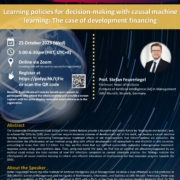Prof. Stefan Feuerrigel gave a talk on “Learning policies for decision-making with causal machine learning: The case of development financing”
The Sustainable Development Goals (SDGs) of the United Nations provide a blueprint of a better future by “leaving no one behind”, and, to achieve the SDGs by 2030, poor countries require immense volumes of development aid. In this work, we develop a causal machine learning framework for estimating heterogeneous treatment effects of aid disbursements that inform optimal aid allocation. We demonstrate the effectiveness of our method using data with official development aid earmarked to end HIV/AIDS in 105 countries, amounting to more than USD 5.2 billion. For this, we first show that our method successfully computes heterogeneous treatment-response curves using semi-synthetic data. Then, using real-world HIV data, we find that an optimal aid allocation suggested by our method could reduce the total number of new HIV infections compared to current allocation practice. Our findings indicate the effectiveness of causal machine learning to inform cost-efficient allocations of development aid that maximize progress towards the SDGs.




